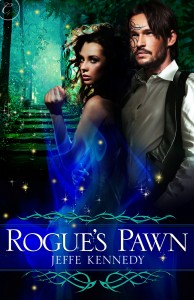I’ve signed a deal with Carina Press for Hunting the Siren, the sequel to Feeding the Vampire and the second book in the “Blood Currency” series. Look for it soon!
Self-Publishing: Whee or Erf?
I’m over at Word Whores today for my Sunday sermon on self-publishing. And why Petals and Thorns has a new cover.
Networking and the Value of Writing Friends
 Forest fire season is starting here and the skies are filled with smoke this morning. The flip side to this is that the sunsets should get pretty spectacular.
Forest fire season is starting here and the skies are filled with smoke this morning. The flip side to this is that the sunsets should get pretty spectacular.
We’re also hitting summer conference season. I have RomCon in June and RWA National in July. I was considering DragonCon in August, but decided against it and am waffling on World Fantasy Con in November. For me, it’s mainly a question of time commitment, though going to conventions can be pricey. A lot of writers (or their spouses!) try to parse out the return on investment (ROI) for going to conventions. They try to calculate if book sales increase in proportion to the expense of going.
This kind of math is impossible to do.
A number pre-pub writers have told me they’re not going to a convention until they have a book to sell. I usually nod understandingly, but I usually want to take them by the shoulders and shake some sense into them.
Because you don’t go to conventions to sell books.
You go to make friends.
And, not to sound like a famous advertising meme, these kind of connections are beyond price.
That’s what networking is all about. It sounds like this very dry thing, which I suppose it can be. But in truth, networking is about forming friendships, finding your tribe, developing that extended family of choice. In reality, it’s the least dry effort there is. Those friendships become your greatest support. These will be the only people in your life whose eyes don’t glaze over when you weep over your 49th rejection and who rejoice right with you when that 50th query strikes gold. They will pet you when those edits seem too difficult to contemplate and understand why it’s just SO VERY WRONG that your heroine on the cover is holding a knife. They are also your first and best cheerleaders.
Today, there’s an article in USA Today on the Happy Ever After Blog with a list of recommendations from authors for books like Fifty Shades of Grey. Two of my friends recommended my books – one said Petals and Thorns and the other cited Sapphire. I owe them big time for this and will find ways to pay it back. But I also know I don’t have to, because they’re my friends.
Beyond price, I tell you.
Overplanting and Planning Series Too Close Together
 The desert four o’clocks bloom in these random patches, spots of brilliant color I come on unexpectedly while walking. Better than a Cracker-Jack prize.
The desert four o’clocks bloom in these random patches, spots of brilliant color I come on unexpectedly while walking. Better than a Cracker-Jack prize.
Well, Feeding the Vampire is now officially book 1 in a new series! My Ellora’s Cave editor, the lovely and delightful Grace Bradley, accepted Blood Siren, which now has the working title Hunting the Siren, as book 2 in the Blood Currency series!
Yes, it’s been a busy week. Funny how nothing seems to happen for months on end and then, boom! all in the same week.
So this means I have two official series now, Blood Currency and A Covenant of Thorns. It’s three if you count the Sapphire and Platinum books, which I refer to as the jewel series – but no one has given me an official series title for those, so I think they remain a looser grouping. None of these are contracted series, meaning I don’t have money wrapped up in delivering the next book by a particular deadline. From what I’ve seen of my cohorts with contractual deadlines, this is a pretty nice place to be.
Still, it hit me last night that I’m really moving forward with three series now. And, if I sell The Body Gift and The Middle Princess, that could bring it up to five.
It reminds me of the advice always given to new gardeners and landscapers, not to plant too closely together. Of course, the urge to do this is irresistible, especially when you have a vast expanse of nothing nothing nothing.You *want* to fill it up with stuff, as much as possible, as fast as possible.
We did this at our first house. We had this very long strip of back yard out to the alley, bordered on one side by a chain-link fence and a parking lot. SO ugly. And we had less than zero money to put in a privacy fence. So we planted seedling trees and shrubs, all along the fence. One day, at the city landfill, David scored a bunch of hail-damaged bushes and trees Walmart was dumping. He came back with a truck empty of gardening detritus and full of a small forest. We planted them ALL. Some died, but about two-thirds lived and thrived.
All this time we knew we shouldn’t plant them too close together. All the friends, all the landscaping books, warned us not to.
But we just didn’t care. We had this great ugly desert of nothing and we wanted to fill it up, whatever it took. We always figured we could deal with overgrowth later. Or let the next homeowner deal with it.
Are you waiting for the moment of Great Regret?
Never happened. It’s funny, telling this story and realizing that we never regretted that for a moment. In fact, when we decided to sell, the real estate agent walked into the backyard and actually took a breath in wonder. Our tiny house had this forested, shady grove in back, with winding paths and sweet feeling of privacy.
I suppose I’ve answered my own question now. I may indeed have overplanted. But I’m not sorry now. I’d be sorrier to have nothing nothing nothing.
I’ll take the abundance with gratitude.
Rogue’s Pawn Cover Reveal!
Here it is!!!!!
Rogue’s Pawn
This is no fairy tale…
Haunted by nightmares of a black dog, sick to death of my mind-numbing career and heart-numbing fiancé, I impulsively walked out of my life—and fell into Faerie. Terrified, fascinated, I discover I possess a power I can’t control: my wishes come true. After an all-too-real attack by the animal from my dreams, I wake to find myself the captive of the seductive and ruthless fae lord Rogue. In return for my rescue, he demands an extravagant price—my firstborn child, which he intends to sire himself…
With no hope of escaping this world, I must learn to harness my magic and build a new life despite the perils—including my own inexplicable and debilitating desire for Rogue. I swear I will never submit to his demands, no matter what erotic torment he subjects me to…
Why Pitching is Never a “Make or Break” Deal
 Here’s another shot of the eclipse that you can’t tell is an eclipse. Still kind of pretty though.
Here’s another shot of the eclipse that you can’t tell is an eclipse. Still kind of pretty though.
This week on the group blog I share with other fabulous speculative fiction writers, the Word Whores, we’re talking about the one that got away. It’s the idea that someone or something slipped through your fingers, an opportunity forever lost, the ship sailing away without you.
And I just don’t believe in this.
More, through my career as a writer, I’ve come to see that there really is no such thing as a lost opportunity. You see this advice all the time from editors and agents, e.g., don’t think your pitch appointment is your make or break moment. This is a difficult piece of advice to understand, because it FEELS like it is. Especially at first.
When I was first trying to sell Rogue’s Pawn (Book 1 in the Covenant of Thorns series! Out July 16!! Muppet Flail!!!), and this was several years ago now, I joined RWA expressly so I could go to the National Conference to pitch my book to an agent and editor I couldn’t access otherwise. I signed up, nagged them to give me my PRO status (if you don’t know what that means and you want to, go here), so I could get the early opportunity to snag an appointment. I only went to the conference for a couple of days – flew in from a day job trip and flew out again two days later, right after my pitch appointments. Both requested to see more, the agent 100 pages and the editor the full manuscript. Afterwards, I sat in the bar by myself (because I didn’t know anyone) and drank a glass of champagne, congratulating myself for seizing the opportunity.
Both said no.
I sat on my metaphorical dock, watching that ship sail off into the sunset without me and wondered what to do. Should I sit there for another year, until the next National conference? What if that ship sailed, too.
Clearly that’s just not an option if you’re not the type who’s fond of sitting on her butt, doing nothing.
So I dug up other opportunities, found many avenues to pursue. I can talk about those sometime, if anyone wants me to. But the point I’m attempting to make today is, I’ve talked to SO MANY editors and agents now, that it’s no longer a big deal. Some of them I count as friends. They’re interesting people with jobs relevant to my field. Some I work with directly, some I don’t.
But there’s no longer this huge charge over pitching a project to them. Maybe it will be a hit with them, maybe not. One agent has now read three of my novels and I know that each time she hopes it will be something she can fall in love with. Maybe that will happen. Possibly it will happen with someone else first. But I’ve talked with her about projects for years now. None of those conversations were make or break.
That’s the thing: ships don’t really sail away, never to return. If you frequent a busy port, there are ships coming and going all the time. The idea that just one is for you is ridiculous and self-limiting. We live in the modern era. There are lots of ways to get to India.
And lots of fish in the sea.
Stepping Stones and Brass Rings – A Publishing Primer
 This is the sun setting during the annular solar eclipse. Obviously I don’t have the right filters for you to actually SEE that the sun is 95% occluded, but it did make for interesting light.
This is the sun setting during the annular solar eclipse. Obviously I don’t have the right filters for you to actually SEE that the sun is 95% occluded, but it did make for interesting light.
So, a lot of you know this information already. If so, you may be excused from today’s blog. Go sit in the sun and have some lemonade or something!
But, there’s apparently a lot of up and coming writers out there who don’t know this stuff, so I’m doing a little primer today. Last week, while I was being the Twitter voice for Carina Press, I saw a question come through from an aspiring writer asking if Carina, as a digital first press, ever then passes along books to another imprint for print publication. The asker was thinking of the Fifty Shades of Grey phenomenon and how the book went from ebook to print publication by a major publishing house. She was inexperienced enough not to know what question to ask and came across as sounding like she regarded ebook publication as a stepping stone to “real” publication.
I understood where she was coming from, because I get asked quite frequently if any of my ebooks will get “really published.”
Stepping stones – moving from smaller venues to bigger ones – is the path for most artists. The Beatles started out playing obscure bars in Germany and ended up on American television and playing to huge crowds. It’s a fact of life that it’s easier to get published with smaller presses to begin with than it is with major houses. Major houses have more choices, so they can be more selective. It’s also easier to self-publish than to be published by a smaller press – because there is no filter at all. Among the smaller presses, there is certainly a hierarchy. Some simply publish better stuff than others – because they have more choices and can be more selective. Now, you’re not going to find this hierarchy written down anywhere. And it changes over time. It’s largely governed by where writers want their work to be published (or where their agents want it). Sometimes this is about money, sometimes about distribution, sometimes about cache.
For a long, long time, the brass ring – the big golden prize – was publishing with “New York” or “The Big 6,” now often referred to as “legacy publishing” or “traditional publishing.” This is where the big advances were, the distribution, the cache. Publishing with New York was the literary equivalent of signing with a major record label. You might not be playing stadiums right away, but you had a shot at it.
What EL James did with Fifty Shades of Grey is write fan fiction first. A lot of authors start this way – writing stories based on someone else’s world and characters. It can be a good way to learn, just like a lot of bands start out playing covers. Self-publishing for a new writer, then, is the equivalent to standing on street corners and singing for tips. It’s a lot of work, takes a lot of courage and hustle. Things can absolutely happen that way. Billy Bragg got started that way. But you’re not going to get screaming fans packing the street right off the bat, not like if U2 decides to do a street gig. They have the audience already. The busker spends a lot of time in the rain, singing to no one.
For EL James, she hit lucky. She was a busker who got picked off the street, signed to a major label and is playing to stadiums. (I know that’s a bit of a gloss, but allow me the analogy here.) It’s great for her. It’s also not how it works for 99.9% of the writers out there. In other words: don’t try this at home.
Most writers follow a path more like The Beatles. Lots of practice, lots of tiny, obscure gigs, then better gigs, building an audience, hitting the lists in the UK, then hitting the US. It seems like an overnight success, but only if you’re not paying attention.
The thing is, publishing is all in upheaval right now. It’s unclear if New York is really the brass ring anymore. Moneywise, authors who are not playing to stadiums, stand to do much better with epublishing. The royalty rates are far, far better. No advances, but that may be an outmoded model anyway. Sure, it’s lovely to go to print, but with bookstores on the decline, does that distribution really mean what it once did? People around the world can read my ebooks who would never see a print version.Which is better?
So, it’s too late to call this a short answer, but: yes, sometimes digital first publishers also print books on paper. It depends on the press. But you sell a book to one publisher – they don’t then pass it along to a competitor. The author decides who publishes the book and signs a legal contract. Are some presses “better” than others? Yes. And the only people who can answer this question are other authors. Even then you have to take it with a grain of salt, because everyone wants to spin their own publisher as the best. Agents can also advise on this, but their criteria can be different, so you have to take that into account.
The upshot of all this upheaval is, suddenly there are so many more opportunities, so many rings of different colors and sizes to reach for. It’s up to the writer to decide what she wants.
How to Have the Happy
 First things first – I’m in the newspaper today! The local paper, The Santa Fe New Mexican, asked if they could do a feature on me. I checked my very busy schedule and managed to squeeze in an interview.
First things first – I’m in the newspaper today! The local paper, The Santa Fe New Mexican, asked if they could do a feature on me. I checked my very busy schedule and managed to squeeze in an interview.
Then, I’m over at Word Whores and LERA today (same post in both places), on the one that got away and choosing happiness.
Identifying Writer’s Block – and Resolving It
 One of the fun things about where we stayed on St. Thomas was watching the cruise ships glide by in the mornings and evenings. Extraordinary how these small sailing cites come and go.
One of the fun things about where we stayed on St. Thomas was watching the cruise ships glide by in the mornings and evenings. Extraordinary how these small sailing cites come and go.
Little shameless plug: you can now sign up for my newsletter!! I know – you all are gasping in giddy surprise. I’ve been told (in no uncertain terms and by readers, amazingly enough) that I *need* to have one. If you want to subscribe (and I totally do not blame you if you don’t), there’s a place to do it in the right-hand column of the home page. One of my readers, the lovely Susan Doerr, even volunteered to compose one for me and it’s really just great. (I suspect she worried about what travesty I’d come up with on my own, given my hatred of all things newslettery.) This is very simple, comes to your email In-Box and we’ll only do it quarterly or so. I’m told I’ll have special treats and giveaways, too. Whee!
Okay: Writer’s Block.
So, those of you who have been reading my blog for a long time might be surprised by today’s topic. I’ll be up front: I have never believed that Writer’s Block is a real thing. In fact, I had to create the label for it just now. I’m a big believer that habit and ritual will get words down. I’ve always thought that Writer’s Block was more about angsting over the process – and maybe a bit of resistance towards just doing the work – than anything real.
And then I hit it.
I didn’t even know what it was.
See, what happened was, last Friday I got my developmental edits on Platinum. They’re not bad – Editor Deb Nemeth is excellent at her job: specific, clear, good insights. I even wrote a post last week about how she pushes me to write difficult scenes. She also asked me to layer in more detail about the setting in Charleston, SC, and my heroine’s daily life owning an art gallery.
Several of my friends joked that I clearly needed to take a tax-deductible research trip to Charleston. I laughed.
Now, I’ve been to Charleston a few times, but not since, um, maybe ten years ago? And I’ve shopped in art galleries there. I have friends who own small businesses that sell to the public, but they’re more coffee shops and bookstores. But hey, I’m the queen of networking, right? So I set to finding someone to talk to.
I hit wall after wall after wall. Nobody answered their phones or responded to the messages I left. The one gallery owner I talked to, from Santa Fe, was very weird to me. The Charleston Chamber of Commerce interactive marketing director advised me on how to look up galleries on their website.
It was all very weird.
I tried to work on the edits and got nowhere. The layering thing bothered me. I kept Googling, placing calls, asking my email loops.
Nothing. Nothing. Nothing.
So, at lunch on Wednesday, I was whining expressing my frustration to David and he said something was clearly in my way. That I was blocked for some reason. “Normally,” he said, “you just do stuff like it’s no problem. You’re doing something wrong here.”
As soon as he said it, it all made sense. It described precisely how I felt: Blocked. Nothing was flowing as it should. Nothing was going my way on this.
“I think you should just go to Charleston,” he said.
And I laughed, like I’d laughed before. I started to tell him how I didn’t have the time or the money for such an extravagant move. Then it occurred to me that I’d just been told I needed to fly to Providence, RI on June 3, for the day job. That’s at least the correct side of the country. I checked into the plane tickets and I could fly to Charleston on Friday, spend the weekend and be in Providence by Monday morning.
So, that’s what I’m doing.
I’ll tell you what – as soon as I bought that ticket, everything started flowing again. People returned my messages, I started revising happily and easily. Bluebirds perched on my desk and sang sweet songs of joy.
I don’t know why I have to go to Charleston, but it’s clear I do.
I don’t recommend this method for resolving all Writer’s Blocks, but I think the lesson here is to listen to yourself. When you feel blocked at every turn, there’s a message in that. Sometimes the answer is to do that thing you think can’t be done.
It might open all the doors.
Doggedness, Stick-to-it-iveness and Perseverance
 This is a crop from the same series as yesterday’s pic. I was trying to capture the glow of this color. As you can see, I got nice glow, and the background gravel is in perfect focus. Not so much the flowers. Always some new skill to work on.
This is a crop from the same series as yesterday’s pic. I was trying to capture the glow of this color. As you can see, I got nice glow, and the background gravel is in perfect focus. Not so much the flowers. Always some new skill to work on.
Which keeps life interesting.
I’ve been buckling down since the Caribbean vacay, to take off the vacation-indulgence weight. Oh, and the Thanksgiving/Christmas indulgence weight. Yes, yes. I know it’s over halfway through May already. (Though, while we’re on the topic, how the HELL did THAT happen??) I got back on normal eating and exercising after the holidays, but never quite amped myself up to take it up that extra notch to really lose body fat.
So, I’ve added weightlifting back into the exercise routine and, this week, I took the added and dramatic step of not drinking wine.
*Sob*
Yes, you heard me right. No alcohol Monday through Thursday nights is the new rule. If you know anything about me, you understand how much this breaks my heart. But counting calories was just not quite doing it. I figured, if I cut out the wine four nights a week, that would be enough to change things.
It’s changed things all right.
My weight is going UP. I’ve gained almost THREE pounds since last Sunday!
I know, I know – it’s the whole gaining muscle and muscle is denser than fat thing. I am down just over two pounds of body fat. I try to focus on that part and not the climbing overall poundage. Intellectually I know the program is working the way it should, but the irrational part of me, the part who misses her goddam glass(es) of wine in the evening, is having a screaming tantrum.
I suppose that’s part of any progress in life – managing the sulky, indulgent part of ourselves and sticking to the plans we make. When we get rejections or difficult revision letters or sales below what we hoped, that’s the voice that whines that we’re not having FUN anymore.
There’s a story passed around among my mom’s friends from many years ago. They all decided to go on a bike ride. Believe me, this was not an athletic, outdoorsy group. But they got a wild hair and all saddled up their bikes. One gal even got one of those little bike-trailer dealies and put her three-year-old daughter, Betsy, in it. They rode up to Cherry Creek reservoir and back. This effort nearly killed them, particularly Betsy’s mom, what with pulling the bike trailer. So they collapse and hit the cocktails upon their return – much more in character for the group. (See? I come by it honestly.) Betsy, however, did not like this phase of the day. Scowling at the group, she declared “I *was* having fun, but I’m not having fun anymore!”
This became a mantra applicable to ever so many situations.
So, I try to find ways to soothe my Betsy. To promise her that fun will be had again. She doesn’t really care so much about my goals of fitness or writerly fame and fortune. She’s all about the right now. I try to remember that and make some time for the playing and fun, after the work is done.
There’s a place for that, too.

